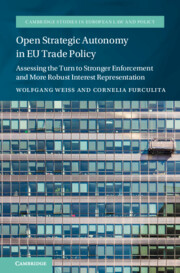 Open Strategic Autonomy in EU Trade Policy
Open Strategic Autonomy in EU Trade Policy Book contents
- Open Strategic Autonomy in EU Trade Policy
- Cambridge Studies in European Law and Policy
- Open Strategic Autonomy in EU Trade Policy
- Copyright page
- Contents
- Preface
- Abbreviations
- 1 Introduction
- Part I EU Trade Policy and Its Constraints
- Part II The Tools for Stronger Enforcement of Trade Rights
- Part III The Tools for Assertive Representation of EU Interests
- 8 The IPI Regulation
- 9 The Foreign Subsidies Regulation
- 10 Carbon Border Adjustment Mechanism
- 11 Conclusion
- Bibliography
- Index
9 - The Foreign Subsidies Regulation
The Way Forward to Competitive Equality and Exterritoriality of EU Competition Law?
from Part III - The Tools for Assertive Representation of EU Interests
Published online by Cambridge University Press: 29 November 2024
- Open Strategic Autonomy in EU Trade Policy
- Cambridge Studies in European Law and Policy
- Open Strategic Autonomy in EU Trade Policy
- Copyright page
- Contents
- Preface
- Abbreviations
- 1 Introduction
- Part I EU Trade Policy and Its Constraints
- Part II The Tools for Stronger Enforcement of Trade Rights
- Part III The Tools for Assertive Representation of EU Interests
- 8 The IPI Regulation
- 9 The Foreign Subsidies Regulation
- 10 Carbon Border Adjustment Mechanism
- 11 Conclusion
- Bibliography
- Index
Summary
Chapter 9 concentrates on the Foreign Subsidies Regulation (FSR) aimed at tackling the competition distortions on the EU internal market caused by third countries’ subsidies to undertakings operating in this market. It presents the Regulation and argues its purpose of gap-filling due to limited EU state aid rules on this subject. Considering EU’s multilateralist stance and commitment to international law, the last being explicitly inscribed also in the FSR itself, the chapter seeks to determine the limits within which the EU could act. Thus, it provides a comprehensive analysis of the FSR’s compliance with WTO Law, namely WTO subsidies and non-discrimination rules. Furthermore, as the FSR rules might also collide with bilateral norms on subsidies, the chapter analyses the FSR’s compliance with the relevant commitments from most prominent EU FTAs, such as EU UK Trade and Cooperation Agreement, EEA Agreement, or CETA. Finally, the analysis of FSR’s conformity with international law is complemented with the consideration of further potential political implications.
Keywords
- Type
- Chapter
- Information
- Open Strategic Autonomy in EU Trade PolicyAssessing the Turn to Stronger Enforcement and More Robust Interest Representation, pp. 326 - 368Publisher: Cambridge University PressPrint publication year: 2024
